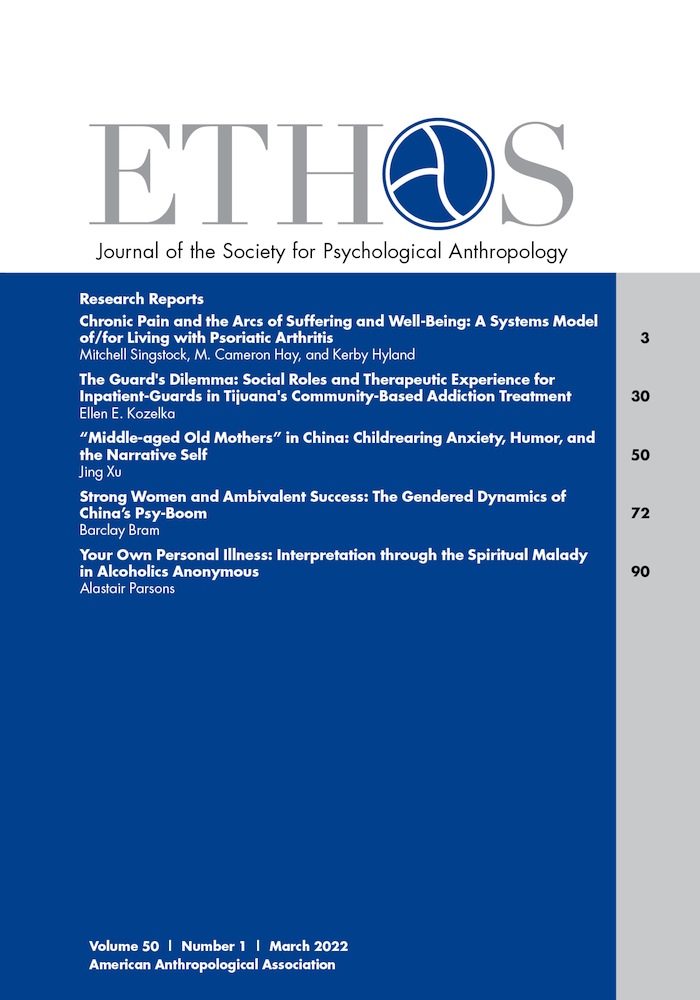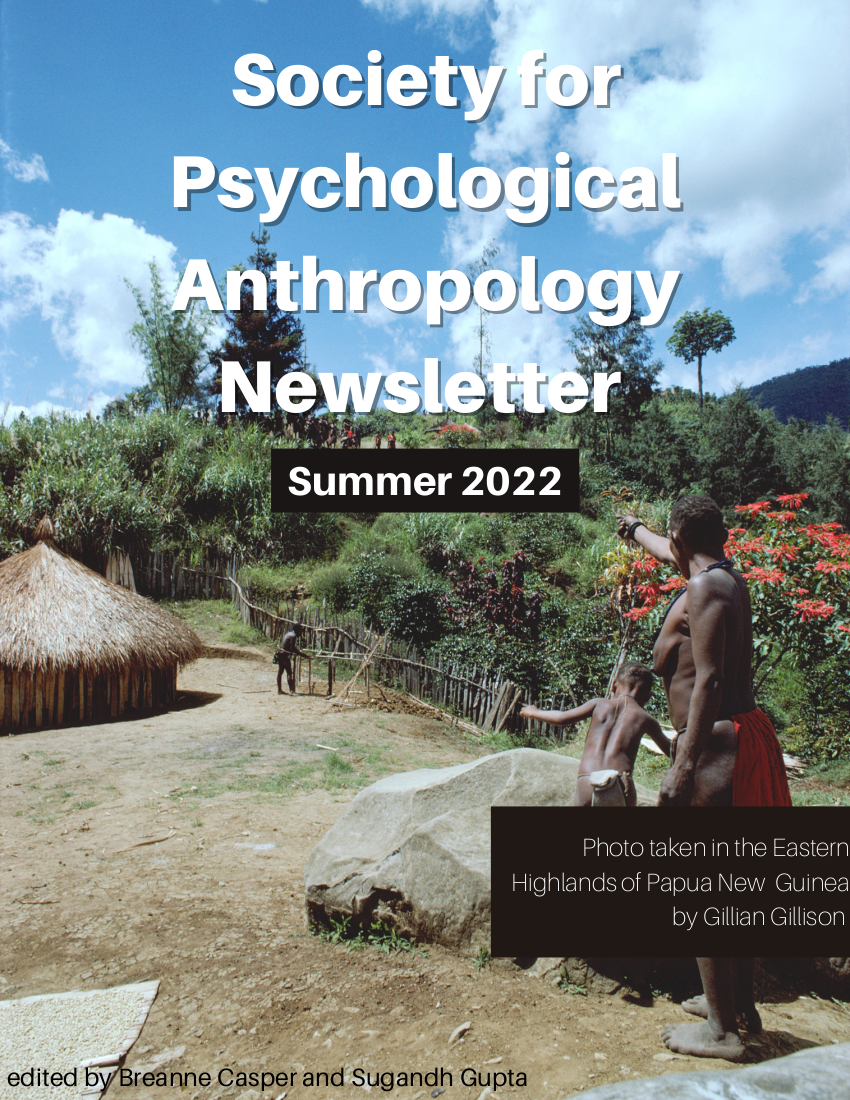Author: spa_eba6af

The Society for Psychological Anthropology is currently soliciting applications for the position of Editor of Ethos. Individuals may apply, or a small editorial team may also apply. Please see the position listing for the relevant information. Sincerely, Ted Lowe
Summer 2022

SPA Newsletter SUMMER 2022
Anthropology 339: Psychological Anthropology
Gerald M. Erchak
Skidmore College
AN 339, Spring 2001
TLC 207, WF 8:10-10
Goals of the course
- This course explores how individual selves as well as the behavior of individuals are shaped by culture and how different cultures tend to produce adults with characteristic personalities, selves, and behaviors. It could justifiably be retitled “Cross-Cultural Social Psychology.”
- Cultural relativism in behavior will be stressed throughout the course, e.g., is “abnormal” or “deviant” behavior in the U.S. also considered abnormal everywhere else?
- However, a universal human nature, biologically and evolutionarily based, is explicitly recognized as the basis for cultural variation.
- The evolution of the brain, the mind, and therefore human nature, will therefore be explored.
- We will focus primarily on psychological issues in nonliterate preindustrial non-Western societies but these examples will frequently be contrasted with similar examples from Western and/or North American society.
- A principal goal of the course is to inform students about the forces shaping their own behaviors, selves, and personalities.
- The arguments are made within an evolutionary-psychological theoretical framework emphasizing biocultural evolution and psychocultural adaptation, i.e., personalities, selves, and behavior are shown to be adapted to ancestral and contemporary environments, both natural and cultural. This framework is an extension of #4 above.
- In addition, personalities, selves, and behavior are constructed by culture and society.
The course is thus a complement and alternative to psychology courses on personality and the self.
Prerequisites
You must be a junior or senior to take this course. You must have satisfactorily completed at least two (preferably quite a few more) courses in psychology or anthropology (other than archeology), or any combination of these.
Textbooks
Mithen – The Prehistory of the Mind
Herdt – The Sambia: Ritual and Gender in New Guinea
Lancy – Playing on the Mother-Ground: Cultural Routines for Children’s Development
Erchak – The Anthropology of Self and Behavior
Cronk, Chagnon, Irons – Adaptation and Human Behavior: An Anthropological Perspective (AHB)
Grading
Midterm – 20%
Second Exam – 30%
Paper and Team Presentation – 30%
Participation – 20%
The paper is a library research paper that describes and analyzes your segment of your Team Presentation; the topic is any psychological topic or issue, within the broad areas described below, treated culturally, anthropologically, or evolutionarily. It may, if you wish, be on a topic different from that of your Team Presentation. The paper should focus at least in part on non-Western, nonliterate, preindustrial society if at all possible, e.g., if you decide to write on, say, “anxiety,” at least one of your illustrative examples should be a foraging, or horticultural, or pastoralist culture. The paper is 12-15 pp. and must be properly footnoted and referenced following the style of the American Anthropologist, readily available in the library. Since no other style is acceptable, and non-conforming papers will be severely penalized, it would be wise to check with me if you don’t “get it.” Papers must involve references to articles from scholarly journals, not just books. At least a half-dozen books and articles are necessary for a good research paper. My office is not a library. You may not utilize on-line sources of any kind!Paper topics must be handed in by Feb. 2. All papers are due, typed, by class time on Apr. 20,regardless of when your Team Presentation is scheduled. Late papers are dropped one letter grade for each day late. Any “Incompletes” (not recommended) based on failure to complete the paper start off minus one letter grade. Handing in papers early is definitely encouraged.
The “Team Presentation” will be discussed early in the term but will involve an oral presentation of some sort by an assigned group of about four or five students, to be delivered at the conclusion of the relevant course topic. The manner of presentation is completely up to your group members. Each team presentation will be about 40 minutes, including class discussion. The idea is for your group to become “authorities” on your subject. Five groups will be selected from the following areas:Evolution of Brain/Mind/Behavior, Adaptation and Human Behavior, Socialization/Development, Sex/Gender, Sexuality, Behavioral/EmotionalMental Disorder, States of Consciousness, Cognition, and/or Emotion.; different topic areas may be possible as well. Each group will examine and prepare a presentation on the cross-cultural or anthropological literature on each area. You will police, and recommend grades for, each other.
I want the course to be discussion-based: come prepared to discuss the readings each day.
Attendance is mandatory. More than two absences (other than bona fide medical excuses) will lower your grade significantly. I take attendance often, and will do so at the beginning of each class; if you’re late, it is your job to let me know after class.
My office is TLC 226. Office hours are TTh 11-12 and WF 10-11.
Topics and Schedule (all dates approximate and subject to change)
Jan. 24-26
Introduction to the course. The study of the self and personality in culture (theoretical and historical background).
Reading Assignment
Herdt – Foreword, Introduction; Erchak – Preface, Ch. 1; Mithen – Preface, Ch. 1; AHB – Chs. 1, 2.
Jan. 31-Feb. 9
Brain and mind evolution.
Reading Assignment
Mithen – Chs. 2-8; AHB – Chs. 12, 13, 14.
Feb. 2
Hand in paper topics; teams selected.
Feb. 14-23
Psychocultural adaptation.
Reading Assignment
Erchak – Ch. 1; Mithen – Chs. 9-11, Epilogue; Lancy – Chs. 1-4; AHB – Chs. 3, 4, 6, 9, 10.
Feb. 28-Mar. 2
Socialization: the formation of the self in culture.
Reading Assignment
Herdt – Ch. 4; Erchak – Ch. 2; Lancy – Chs. 5-8.
Mar. 2
Evolution, Adaptation, and Socialization Team Presentations
Mar. 7
Midterm Exam
Mar. 9-28
Gender, culture, sex, and sexuality.
Reading Assignment
Herdt – all; Erchak – Ch. 3; Lancy – Chs. 9, 10; AHB – Chs. 7, 15.
Mar. 28
Sex/Gender and Sexuality Team Presentations
Mar. 30-Apr. 11
Psychocultural order and disorder: mental and behavioral.
Reading Assignment
Herdt – Chs. 5 (review), 6 (review), 7 (review), Afterword (review); Erchak – Chs. 4, 5.
Apr. 11
Behavioral/Emotional Disorders and States of Consciousness Teams
Apr. 13-18
Cognition and emotion: the thinking, feeling self.
Reading Assignment
Erchak – Ch. 6, Epilogue; Mithen – Chs. 4, 8-11 (review); Lancy – Chs. 1, 2 (review).
Apr. 20
Term papers due; Cognition and Emotion Team Presentations
Apr. 25
Review class.
Reading Assignment
AHB – Ch. 21
Apr. 27
Second Exam Copyright © 2001 Gerald M. Erchak
Anthropology 482 and 582
Psychological Anthropology
UM-Dearborn, Fall 2000
Instructor: Dr. Kathryn Anderson-Levitt
Office: CASL Annex Apt. 29 (upstairs)
Office hours: Tues. 1:00-2:00; Thurs 9:40-10:30; other hours by appointment
Phone: 313-593-5049
Email: katieal@umich.edu
Purpose
This course explores the intersection of psychology and anthropology. In it, we will ask how culture affects people’s behavior. One possible answer is that early childhood experiences or other experiences which vary from one society to another influence the course of one’s life, the shape of one’s personality, and the way one solves problems. However, a more interesting answer is that people develop different cultural models of human nature–models that individuals take to be the “natural” ways in which anybody would behave. We will look for the cultural models implicit in scientific and everyday explanations of human development, behavioral disorder, and ordinary behavior and thinking.
The main objective of the course is to get you to question the explanations of human behavior you use yourself and you hear other people using: Is what you have been taking for granted really the truth about “personality” and behavior? Is there a truth? Does it matter to you in your job or your family life that there might be alternative explanations of human nature just as valid as your own?
Prerequisite: Anthropology 101 or permission of instructor. An introduction to psychology is highly recommended.
Tentative Schedule of Topics and Assignments
| Sept. 7 | Models of the person: How do you explain human behavior? Everyday models from elsewhere; read BockPreface |
| Sept. 12-14 | Ifaluk models; read Lutz Java and Bali; read Geertz How to explain differences between “their”models and “ours”? evolutionism, universalism, relativism; read Bock ch. 1. |
| Sept. 19-21 | Scientific models are cultural too; read LuhrmannIntroduction. Your project. |
| Sept. 26-28 | Psychiatric models of disordered behavior biomedical model; read Luhrmann ch. 1 & ch. 2 psychoanalytic model; read Bock ch. 2 |
| Oct. 3-5 | contemporary psychiatry; read Luhrmann ch. 5 & ch. 7 Some folk models of disordered behavior Guatemalan Maya; read Paul |
| Oct. 10-12 | Kanpo in Japan; read Lock Latah, a culture-bound syndrome in Malaysia; read Bock ch. 11 |
| Oct. 17-19 | Culture-and-personality models of child development Benedict and Mead; read Bock ch. 3. Basic personality structure; read Bock ch. 4 & ch. 6. |
| Oct. 24-26 | Modal personality and a critique of culture-and-personality models; read Bock ch. 5 & interlude & ch. 7. (Hand out exam 1, due on Nov. 7.) |
| Oct 31-Nov 2 | Some folk models of child development Japan, China, U.S.; watch Preschool in three cultures |
| Nov. 7-9 | U.S. on developmental stages; read Harkness & Super French on immaturity; read Anderson-Levitt |
| Nov. 14 | Models of ordinary adult behavior Social interactionism; read Goffman, Bock ch. 8 (November 16 no class due to anthropology meetings; work on projects.) |
| Nov. 21 | Anthropology of emotions; read Potter, Bock ch. 12. |
| Nov. 28-30 | Models of intelligence and learning cognitive anthropology; read Bock ch. 10 situated cognition or the cultural-historical model; read Lave, Wertsch |
| Dec. 5-7 | Presentation of your projects |
| Dec. 12 | Conclusion: Are some models truer than others? ReadBock Postlude. (Hand out exam 2, due on our exam date.) |
Texts
Bock, Philip K. (1999). Rethinking psychological anthropology, 2nded. Waveland. (The first edition from 1988 is also acceptable.)
Luhrmann, Tanya. (2000). Of two minds: The growing disorder in American psychiatry. Knopf.
Coursepack
- Lutz, Catherine. (1985). Ethnopsychology compared to what? Explaining behavior and consciousness among the Ifaluk. In Person, Self and Experience (Ch. 2, pp. 35-80). Geoffrey M. White and John Kirkpatrick, eds. Berkeley: University of California Press.
- Geertz, Clifford. (1984). “From the native’s point of view”: On the nature of anthropological understanding. In Culture Theory (Ch. 4, pp. 123-136), Richard Shweder and Robert LeVine, eds. New York: Cambridge University Press.
- Paul, Benjamin. (1953.) Mental disorder and self-regulating processes in culture: a Guatemalan illustration . In Personalities and Cultures (Ch.7, pp. 150-165), Robert Hunt, ed. Austin: University of Texas Press, 1967.
- Lock, Margaret. (1982/1984). Popular conceptions of mental health in Japan. In Cultural Conceptions of Mental Health and Therapy (Ch. 8, pp. 215-233), Anthony J. Marsella and Geoffrey White, eds. Boston: Kluwer, for D. Reidel in Dordrecht, Holland.
- Harkness, Sara, Charles M. Super, and Constance H. Keefer. (1992). Learning to be an American parent. In Human Motives and Cultural Models, pp. 163-178. Roy D’Andrade and Claudia Strauss, Eds. Cambridge University Press.
- Anderson-Levitt, K. M. (2000). Explaining “falling behind.” Chapter 9 ofTeaching Cultures, forthcoming with Hampton Press.
- Goffman, Erving. (1967). The nature of deference and demeanor. InInteraction Ritual: Essays on Face-to-Face Behavior (pp. 47-95). Doubleday/Anchor. (Reprinted from the American Anthropologist of the American Anthropological Association, vol. 58, June, 1956, pp. 473-502.)
- Potter, Sulamith Heins. (1988). The cultural construction of emotion in rural Chinese social life. Ethos: The Journal of the Society for Psychological Anthropology 16(2):181-208.
- Lave, Jean, and H. J. Reed. (1979). Arithmetic as a tool for investigating relations between culture and cognition. American Ethnologist 6:568-582.
- Wertsch, James V. (1998). From chapter 2 of Mind As Action (pp. 23-46). New York: Oxford University Press.
Requirements
| Attendance and participation, oral and written, including presentation of project | 40 | 20% |
| Exams (5 essays) | 100 | 50% |
| Project, including proposal and draft 1 as well as final version | 60 | 30% |
| Graduate students: book critique | 40 | |
| points: 200 | 100% | |
| for grad students: 240 |
Participation
Attendance is, of course, taken for granted except in cases of illness; it is impossible to recapture through other people’s notes the experience of a class discussion, in-class exercise, or film.
Participation will include sharing your thoughts in class, discussing with me outside of class, discussing with classmates, and bringing in outside experiences (e.g., clippings, TV shows, lectures) relevant to the course. I will also probably ask you to write reactions to some articles during or before class, and this writing will be counted toward your grade.
Project. Alternative models for explaining a behavior or a feeling
The purpose of this project is to force you to try out alternative models of (that is, explanations for) the same behavior. It aims to exercise your thinking by making you try out at least one model that is not particularly compatible with your ordinary way of explaining behavior.
Select a question about human behavior that interests to you. For example, why do some children “bounce off the walls” in classrooms? Why do some people walk down the street having arguments with no one? How can one recognize normal intelligence in a 7-year-old? Your objective is to explore the possibility that different explanations of this behavior may be equally “true.” Become an expert in two different models relevant to the problem that concerns you, and develop an explanation based on each model, making each explanation as convincing as possible. Yes, you may choose an everyday or non-Western explanation for one of your two models, but become an expert in it to the extent possible.
Step 1. Select a topic and find out what kinds of information are available about it.
Step 2. Consider which two models you’d like to apply to your problem and find out what kinds of information are available about them.
Step 3. Turn in a project statement with a first bibliography of actually available works you intend to use by September 28.
Step 4. Turn in first draft by November 21.
Step 5. Present your work-in-progress either formally or informally as time permits, and receive feedback from the class.
Step 6. Turn in final polished version by December 12. Please turn in two copies.
Some models we will probably “cover” to some extent in class:
| Scientific models | Everyday models |
| Psychoanalysis | Ifaluk (Micronesia) |
| Biomedical models of behavioral disorder | Javanese |
| Various models from the Culture-and-Personality School | Balinese (see writings by Unni Wikan as well as Geertz) |
| Social interactionism | French teachers on child development |
| Anthropology of emotions | Middle-class Americans on child development |
| Cultural-historical models of learning and thinking | French teachers on child development |
| Japanese on child development | |
| Chinese on child development | |
| Chinese on will and emotion | |
| Guatemalans on behavioral disorder | |
| A Japanese approach to behavioral disorders |
Exams
There will be two take-home essay exams. The first will probably consist of two essays on issues of child development and behavioral disorders. The second will probably require three essays, one on ordinary behavior, one on thinking, and one recapitulating themes of the course. Please turn in two copies.
GRADUATE STUDENTS
Read one book-length study in psychological anthropology and critique the book in the light of what you know so far about culture and human behavior. That is, summarize the author’s argument, then evaluate and comment on it in light of what you are learning in this course and what you have learned in other courses. Due date: **
You may choose either one of the classics in the field (by an author such as Sigmund Freud, Margaret Mead, Ruth Benedict, John and Beatrice Whiting, Erving Goffman) or a more recent work (for example, by Gil Herdt, Richard Shweder, Catherine Lutz, Michelle Rosaldo . . .). Browse in Bock’s list of references for more ideas. Education students, a number of beautifully written “classics” concern children’s and adolescents’ “education,” broadly defined, and would be of particular interest to you.
Other recent publications I recommend include:
Bettleheim, Bruno. 1983. Freud and man’s soul. Knopf.
Lave, Jean, and Etienne Wegner. 1991. Situated Learning. Cambridge.
Rogoff, Barbara. 1990. Apprenticeship in Thinking: Cognitive Development in Social Context. Oxford. (Mardigian)
Runyan, William. 1982. Life Histories and Psychobiography. Oxford. (Mardigian)
Whiting, Beatrice, and Carolyn Pope Edwards. 1988. Children of Different Worlds. Harvard. (Mardigian)
Confirm your choice of a book me several weeks before the due date.
* * *
The University will make reasonable accommodations for persons with documented disabilities. Students should register with Disability Resource Services located in 1060 UM. You must be registered by January 29, 1999 to be guaranteed services during Winter Term 1999.
* * *
Note: The anthropology discipline will be keeping one copy either of your exam essays or of your project as part of our assessment effort. They will be used to document our students’ learning over the course of years.
* * *
Plagiarism is not acceptable. Do not submit any work in which you represent the words or ideas of someone else (for example, another student, an author of an article or book, an anonymous author on the web) as your own ideas or words. Use other people’s ideas (thoughtfully), but cite your sources!
* * *
Please email me with your correct email address when you have read this syllabus. Copyright © 2001 Kathryn Anderson-Levitt

2022 SPA Condon prize committee announcement
The Society for Psychological Anthropology solicits entries for the Richard G. Condon Prize for the best student essay in psychological anthropology. The winner will be awarded $500 and a one year membership in the Society for Psychological Anthropology. The winning essay will be published in Ethos after working with the Editor for final preparation of the manuscript.
The prize is named for the late Richard G. Condon, whose work included the study of adolescence, family, and change among the Canadian Inuit. Psychological anthropology is defined broadly to include interrelationships among psychological, social and cultural phenomena. Essays will be judged on their relevance to psychological anthropology, organization and clarity, and their theoretical and methodological strengths. The author must have been an undergraduate or graduate student during academic year 2021-2022. The author need not be a current member of the Society for Psychological Anthropology. The winner will be recognized at the SPA Business Meeting at the 2022 Annual Meeting of the American Anthropological Association.
2022 Condon Committee Members:
Whitney Duncan
Department of Anthropology
University of Northern Colorado
Beatriz Reyes-Foster
Department of Anthropology
University of Central Florida
Courtney Cecale (former prize winner!)
Department of Anthropology
University of North Texas
Papers submitted for consideration must follow these guidelines:
- The submitted paper must not be published in any form, or currently under review for publication in any outlet in the U.S. or abroad.
- Papers must not exceed 9,000 words inclusive of all references, endnotes and acknowledgements.
- Papers must follow the American Anthropological Association style guide.
- Submitted papers must be emailed as a single Microsoft Word document to the Chair of the committee, Whitney Duncan at whitney.duncan@unco.edu. Do not submit papers directly to other committee members. The deadline is June 1, 2022.
- To submit, in the email to Dr. Duncan:
- Subject line of the email should read “Condon Prize Submission.”
- In the body of the email, provide the author’s name, permanent (not institutional) mailing address, email address, student affiliation (university and department), and the title of the paper that is attached.
- Confirm student status in the body of the email and provide an estimated date of graduation.
- Ensure that no evidence of the author’s identity is evident in any way in the text of the Word document or by reference in the paper.
Please send your submissions to Whitney Duncan at whitney.duncan@unco.edu by June 1, 2022.
Please direct any questions to Neely Myers, SPA’s Secretary, at namyers@smu.edu.
All award and selection committees abide by the SPA’s Conflict of Interest Statement and Recusal Policy.
Edward Lowe
2013 winner

The winner will be announced at the Spring 2023 Biennial SPA meeting and will receive a $500 cash prize.
The Stirling Prize is awarded to a previously published work (this year, it will be awarded for a book) that makes an outstanding contribution to any area of psychological anthropology. Unpublished manuscripts, dissertations, and web publications are not eligible. Edited volumes are not eligible for the book prize.
Books published between December 31,2020 and May 31, 2022 are eligible for consideration. All nominations, including self-nominations, must be accompanied by a cover letter from a member of the SPA discussing the significance of the work’s contribution to psychological anthropology. The nominator must arrange to have copies of the work sent for the selection committee to review and must include a cover letter (1-2 pages) outlining the work’s contribution to the field.
The Stirling Prize Committee includes:
Chair: Jason DeCaro
University of Alabama
Sarah Willen
University of Connecticut
Anita Von Poser
Martin Luther University Halle-Wittenberg
Books and nomination letters need to be sent individually to ALL committee members with a postmark no later than June 1, 2022 for consideration. Books previously considered cannot be reconsidered. Please email Neely Myers, Secretary of the SPA at namyers@smu.edu for mailing addresses for submission of hard copy books well in advance of the deadline and with other questions. The email subject line must read: “SPA Boyer Prize Address.”
The Stirling Prize is awarded to a previously published work (this year, it will be awarded for a book) that makes an outstanding contribution to any area of psychological anthropology. Unpublished manuscripts, dissertations, and web publications are not eligible. Edited volumes are not eligible for the book prize.
Books published between December 31,2020 and May 31, 2022 are eligible for consideration. All nominations, including self-nominations, must be accompanied by a cover letter from a member of the SPA discussing the significance of the work’s contribution to psychological anthropology. The nominator must arrange to have copies of the work sent for the selection committee to review and must include a cover letter (1-2 pages) outlining the work’s contribution to the field.
The Stirling Prize Committee includes:
Chair: Jason DeCaro
University of Alabama
Sarah Willen
University of Connecticut
Anita Von Poser
Martin Luther University Halle-Wittenberg
Books and nomination letters need to be sent individually to ALL committee members with a postmark no later than June 1, 2022 for consideration. Books previously considered cannot be reconsidered. Please email Neely Myers, Secretary of the SPA at namyers@smu.edu for mailing addresses for submission of hard copy books well in advance of the deadline and with other questions. The email subject line must read: “SPA Boyer Prize Address.”
Carol Worthman
2021 Winner
2005 Winner
